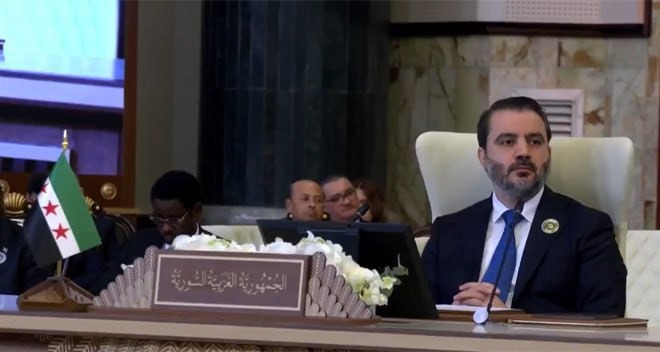Syrian FM Touts National Recovery, Rejects Foreign Interference at Arab Summit
By Kardo Roj
BAGHDAD, Iraq (North Press) – Syrian Foreign Minister Asaad al-Sheibani stated Saturday that Damascus has embarked on “serious” efforts to achieve national recovery and preserve territorial unity, in remarks delivered during the 34th Arab League Summit held in Baghdad.
Sheibani emphasized that Syria is working to build an inclusive nation that accommodates all citizens, while firmly rejecting what he described as attempts to “partition Syrian territory.” His comments reflect ongoing tensions over territorial control, particularly in areas governed by the Autonomous Administration of North and East Syria (AANES) and other regions outside Damascus’s authority.
“Any attempt to cut off parts of Syrian land is completely rejected by the Syrian people,” Sheibani said, adding that Syrians will not compromise on their right to self-determination, free from foreign interference.
Speaking to a room of regional leaders, Sheibani framed the Baghdad summit as a “historic opportunity” to revive Arab unity and coordination in light of ongoing conflicts and shifting geopolitical alignments. He stressed Syria’s commitment to its Arab identity and its desire to strengthen ties within the region.
“We are committed to our Arab depth,” the foreign minister said. “Arab unity remains a cornerstone for building a shared future.”
His remarks follow a recent thaw in regional diplomacy, with several Arab states restoring or upgrading relations with Damascus after years of isolation during the Syrian conflict. These developments come amid renewed calls for reconstruction, humanitarian access, and a political solution to the protracted war.
In his address, Sheibani reiterated that the Syrian government continues to battle remnants of the Islamic State (ISIS), which he blamed for efforts to destabilize the country. He also alluded to other actors, describing them as “separatist groups” and “sectarian instigators,” without naming specific entities.
Observers note that such rhetoric is frequently used by Damascus to describe the Kurdish-led AANES and its military arm, the Syrian Democratic Forces (SDF), despite their pivotal role in dismantling the ISIS territorial caliphate and maintaining security in vast areas of the northeast.
The SDF, backed by the US-led Global Coalition to Defeat ISIS, continues to confront Islamic State sleeper cells and criminal networks in coordination with local security forces. The AANES, meanwhile, has repeatedly called for a decentralized political solution that recognizes the multiethnic governance model in the northeast—an approach rejected by Damascus.
Sheibani also welcomed what he characterized as a “positive” decision by U.S. President Donald Trump to lift sanctions on Syria, though no such policy change has been confirmed by Washington. His statement may reflect internal propaganda or misinterpretation rather than official U.S. policy.
Additionally, the minister condemned ongoing Israeli military operations in Syria, arguing they fuel regional instability and undermine prospects for peace. The issue of Israeli airstrikes on Iranian-linked targets inside Syria has been a frequent point of contention in Damascus’s foreign policy narrative.

